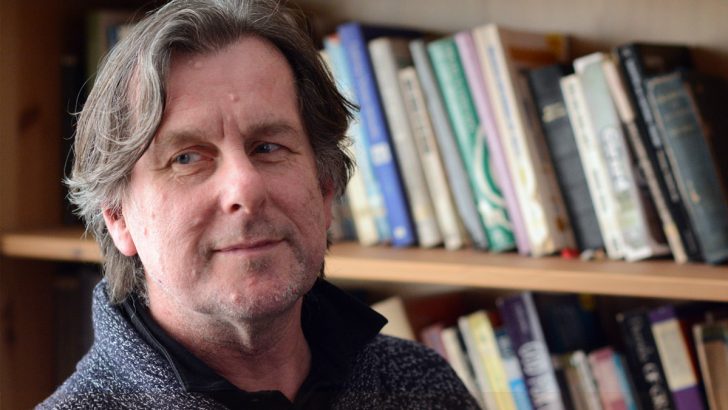Only the Gospel can rescue our society, writes Colm Fitzpatrick
Focusing on our multiple global crises from environmental disasters and financial instability to political upheaval and security threats, Dr Michael Kirwan SJ, Adjunct Associate Professor of the Loyola Institute in Trinity College, Dublin, recently gave a thought-provoking lecture about the failures of secularism and the vital role of theology today.
Entitled ‘Stand upright and raise your hand! Doing theology in dangerous times’, the talk was the first of four public lectures to be hosted by the Trinity College institute.
Beginning his talk, Kirwan reminded his audience of almost 100 people that we are living in “apocalyptic times” as St Paul has reminded us. However, in today’s society, this is not just a metaphor but a living reality where persecution and global warming are prevalent.
Kirwan believes that we are living in deeply troubled times, and – drawing upon the important religious thinker René Girard – sees our various crises as edging towards a ‘tipping point’. The truth of the gospel is the only way to reverse or ameliorate this problem, as opposed to a deficient secularist perspective, he said.
Margins
“The ‘secularist’ world-view which has elbowed religion and religious belief to the margins has dominated western societies for several decades. However, it is now widely seen to be seriously deficient as a description of our modern world,” he pointed out.
“It is now nearly 20 years since a group of British theologians, under the banner of ‘Radical Orthodoxy’, declared that ‘the logic of secularism is imploding’,” he said. “Secularism is reduced to promoting a materialism which is ‘soulless, aggressive, nonchalant and nihilistic.”
The redundancy of secularism is ever more evident today, he argued, given that we struggle with ‘post-truth’ and ‘fake news’, with a retreat from thought and reasoned argument in public life as well as the collapse of the post-war democratic consensus and the resurgence of extremisms.
For Kirwan, these crises “will not easily be solved by technological and scientific means”.
At the same time, Kirwan pointed out that the secular hasn’t completely removed the sacred, which is evident from our language today which is replete “laden with religious meaning”.
“Meanwhile, if we examine our language, it is striking how laden it is with religious meaning. Our situation is often labelled ‘apocalyptic’. Discordant social interactions are described as ‘witch-hunts’ and ‘scapegoating’. Warfare is still understood in terms of ‘sacrifice’,” he said.
“It simply not true that we have moved away from religious ways of thinking and feeling, as the secularist tries to claim.”
In his talk he also referenced another contemporary philosopher, Slavoj Zizek – a Marxist atheist – who insists that the Christian legacy is simply too important to be left to evangelical fundamentalists. For Zizek, the world is faced with an unsavoury choice between two false ‘religions’ – either the self-massaging narcissism of late-capitalist ‘spirituality’, or the herd-like transcendence of fascistic nationalism.
“These are two sides of a coin, as each betrays the same disastrous crisis of identity. In which case, says Zizek, perhaps it is wiser to stay with the Judaeo-Christian tradition,” he said.
Instabilities
The instabilities in the global world today including the fundamentally incoherent worldview of secularism, according to Kirwan, make for an especially opportune time “to do good refreshing theology”, he said, pointing out the fruits of post-Holocaust theology or liberation theology.
Referencing the radical orthodoxy group which rejects the paradigm of modernity, Kirwan said that theologians break out because they recognise the inherent weakness of secularity.
Kirwan acknowledged that this can be a challenge, pointing to the clerical abuse scandals and the Church’s handling of it, and the fact that “Christians have a weird way of speaking about God”.
However, when theologians speak accurately, in a Christian way about God, this can “offer a way beyond the grim alternatives of total self-absorption, or systematic hatred of the other”, he said.
Christian wisdom, as we find it in key passages in the gospels, and in the Book of Revelation, requires us to “stand upright and raise our heads”, he says. “It gives us hints of what it means to flourish in troubled times without being overwhelmed by fear, insecurity and resentment,” he said.
The Book of Revelation is able to give us a sense of our situation as it shows the viciousness of oppressive political power, tells of its dramatic downfall, and celebrates those who persevere in faith. At the end of the book is the glorious political vision, the appearance of the New Jerusalem.
Through faith and love, which are the foundations of the Gospel message, we are enabled to engage in the world in new ways. Religious belief does not pull us away from the world but draws us to it. Kirwan believes that this type of engagement will perhaps require the building of a new political philosophy.
A question and answer session followed the talk, ranging from queries about neo-liberalism to the use of secularity and the reasoning behind it.
Speaking to The Irish Catholic, Dr Kirwan said in response to a question about the role of theology today: “My feeling is that theology in modern western societies needs to take the form of a ‘dangerous memory’– the memory of Jesus Christ, crucified and risen – which interrupts our everyday life and thinking.
“This interruption ensures that society is persistently reminded of the suffering and vulnerability which it too often tries to forget or hide from view.”
Dr, Fáinche Ryan, Director of the Loyola Institute, added: “These types of events challenge people to think critically and expose them to things that they may be uncomfortable with.”
For more information about the Loyola Lecture Series, see: https://www.tcd.ie/loyola-institute/


 Colm Fitzpatrick
Colm Fitzpatrick Dr Michael Kirwan
Dr Michael Kirwan 